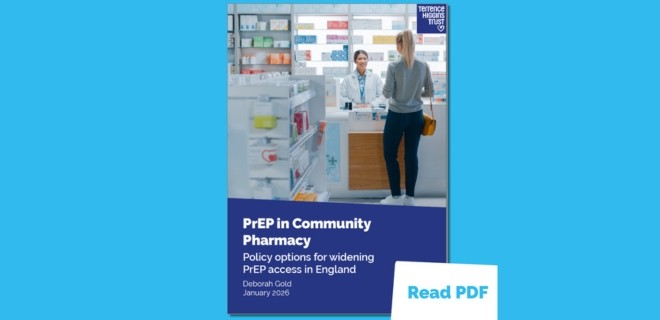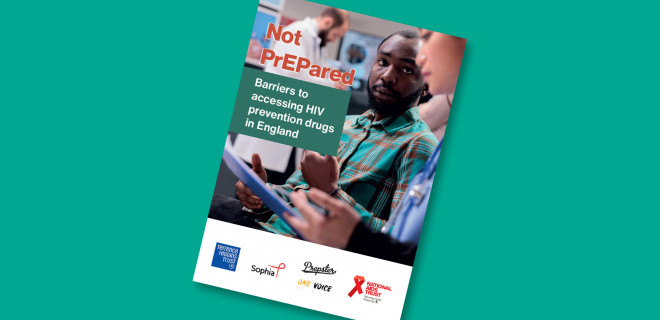Around 1,000 people at risk of HIV will be offered a new long-acting injection on the NHS if they cannot have pills to protect them from the virus.
The rollout of this preventative therapy takes NHS England one step closer to its goal of eliminating HIV transmissions in the next five years.
The cabotegravir injection will be available on the NHS for people who cannot have pre-exposure prophylaxis (PrEP) tablets, in the coming months, following approval by the National Institute for Health and Care Excellence today [17 October].
The new preventative therapy, given every two months, will be provided at sexual health clinics across the country.
PrEP drugs can prevent people who are HIV-negative from acquiring the virus. If a person is exposed to it, the injection works by blocking an enzyme called integrase, which HIV needs to make copies of itself. This stops the virus from multiplying in the body and becoming an established infection.
Today’s announcement comes as the NHS in England aims to become the first country in the world to end HIV transmissions by 2030.
Dr Michael Brady, National Advisor for LGBT + Health at NHS England, said: 'This long-acting injection is a significant addition to our HIV prevention strategies – giving us a powerful new option for people at risk of HIV who cannot have oral PrEP tablets, and helping ensure everyone who needs PrEP can access it.
'We have made huge progress in HIV treatment and prevention in the last decade, and the addition of injectable PrEP will bring us a step closer to our goal of ending HIV transmissions by 2030.'
Secretary of State for Health and Social Care, Wes Streeting said: 'The approval of this game-changing injection perfectly embodies what this government is determined to deliver - cutting-edge treatments that save lives and leave no one behind. For vulnerable people who are unable to take other methods of HIV prevention, this represents hope.
'We're making real progress on HIV, with PrEP use up by 8% this year, and our ambition goes even further. England will be the first country to end HIV transmissions by 2030, and this breakthrough preventative therapy is another powerful tool in our arsenal to reach that crucial goal.'
Richard Angell OBE, Chief Executive of Terrence Higgins Trust, said: 'Injectable PrEP will be transformative for our HIV response. It's highly effective and acceptable for people, and a vital tool for tackling inequalities – with the potential to reach those who are not currently accessing other HIV prevention.
'The system must now roll it out quickly and ensure everyone understands the HIV prevention options available to them. That's why the new HIV Action Plan for England must include action to ensure everyone can access PrEP in a way that works for them. That includes rolling out injectable PrEP and exploring the delivery of PrEP in settings outside of sexual health services.'
HIV is a virus that damages the cells in the immune system and weakens the ability to fight everyday infections and disease, which can result in serious illness and death, if left untreated.
PrEP, whether oral or injectable, works by preventing HIV taking hold in the body if someone is exposed to the virus. It is close to 100% effective at preventing HIV transmission.
The aim of HIV treatment is to suppress the virus particles in the blood, known as the viral load, to 'undetectable levels' so low that it cannot be detected by laboratory tests, meaning it is no longer attacking the immune system and cannot be transmitted to sexual partners.
The latest 2024 HIV surveillance report from the UK Health Security Agency reveals some progress in ending HIV transmission, with new diagnoses dropping 4% nationwide – from 3,169 in 2023 to 3,043 this year.
The approval of this new preventative therapy on the NHS follows the expansion of HIV testing with 30 more A&Es testing for the virus in hospital emergency departments through the NHS Blood Borne Virus Opt-out Testing programme.
The expansion means 89 major hospital emergency departments in England will routinely test anyone who has their blood taken in cities and towns with high rates of HIV prevalence.
Health leaders expect the expanded network of A&E sites will enable up to 1,900 more cases of newly identified HIV or previously diagnosed cases not linked to care to be identified each year by the NHS.
NHS leaders are investing £27 million to support the programme’s expansion this year, having previously invested £20 million to implement routine HIV opt out testing within 34 hospital EDs in 2022.
Dr Will Nutland, Executive Director of PrEPster at The Love Tank, said: 'Oral PrEP has been the only option for those of us using PrEP for HIV prevention until now. The introduction of injectable PrEP provides an option for people who want to use PrEP but cannot use the tablet formulations. Adding more PrEP options makes it accessible to the widest number of people.'
Julie Guest, General Manager at ViiV Healthcare UK, said: 'Expanding the range of HIV prevention options could help improve accessibility for individuals who cannot have daily oral PrEP, supporting national efforts to reduce HIV incidence. As the first and only long-acting PrEP option available in the UK, cabotegravir expands our portfolio and offers an alternative option to help people stay protected.'



